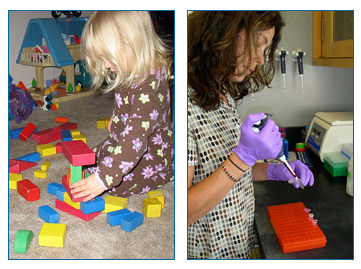
A geneticist working at her lab bench and and a six-month-old baby playing with his food might seem to have little in common. After all, the scientist is engaged in serious research to uncover the very nature of the physical world, and the baby is, well, just playing … right? Perhaps, but some developmental psychologists have argued that this “play” is more like a scientific investigation than one might think.
Take a closer look at the baby playing at the table. Each time the bowl of cereal is pushed over the table edge, it falls to the ground — and, in the process, it reveals critical evidence about how physical objects interact: bowls of cereal (as well as pacifiers, blocks, books, bananas, and other physical objects) do not float in mid-air, but require support to remain stable. It is likely that babies are not born knowing this basic fact of the universe; nor are they ever explicitly taught it. Instead, babies may form an understanding of object support through repeated experiments — systematic interactions with the world around them — and then build on this knowledge to learn even more about how objects interact (e.g., how much physical contact is necessary for support, how the shape of the objects affects one’s ability to support the other). Though their scales and accoutrements differ, the baby’s investigation and the physicist’s experiment appear to share the same aim (to learn about the natural world), overall approach (gathering direct evidence from the world), and logic (are my observations what I expected?).
Though the claim is controversial, some psychologists have argued that many of children’s ideas of how the world works resemble scientific theories:
- These ideas are relatively coherent explanations for some set of phenomena in the natural world.
- Children use them to generate expectations about how people and objects will behave.
- They can be revised or rejected in favor of a new explanation if the weight of evidence goes against the currently accepted explanation.
Some psychologists propose that young children learn about more than just the physical world in this way — that they investigate human psychology and the rules of language using similar means. For example, it may only be through repeated experiments, evidence gathering, and finally overturning a pet theory, that a toddler will come to accept the idea that other people can have different perspectives and desires than he or she has — that, for example, inappropriate behavior can be hidden from a parent’s view by simply moving behind the sofa or that, unlike the child, Mommy actually doesn’t like graham crackers.
Viewing childhood development as a scientific investigation provides insight into how children learn, but it also offers a provocative perspective on science and scientists. Why do young children and scientists seem to be so much alike? Psychologists Alison Gopnik, Andrew Meltzoff, and Patricia Kuhl have proposed that science as an endeavor — the impulse to explore, explain, and understand our world — is simply a holdover from our infancies.1 Perhaps evolution endowed human babies with curiosity and a natural drive to explain their worlds — and adult scientists simply tap into the same explanatory drive that served them as infants. The same cognitive systems that make young children feel good about figuring something out may have been unwittingly co-opted by adult scientists. As Gopnik and her colleagues put it, “It is not that children are little scientists but that scientists are big children.”
1Gopnik, A., A.N. Meltzoff, and P.K. Kuhl. 1999. The scientist in the crib. New York: William Morrow and Company, Inc.
